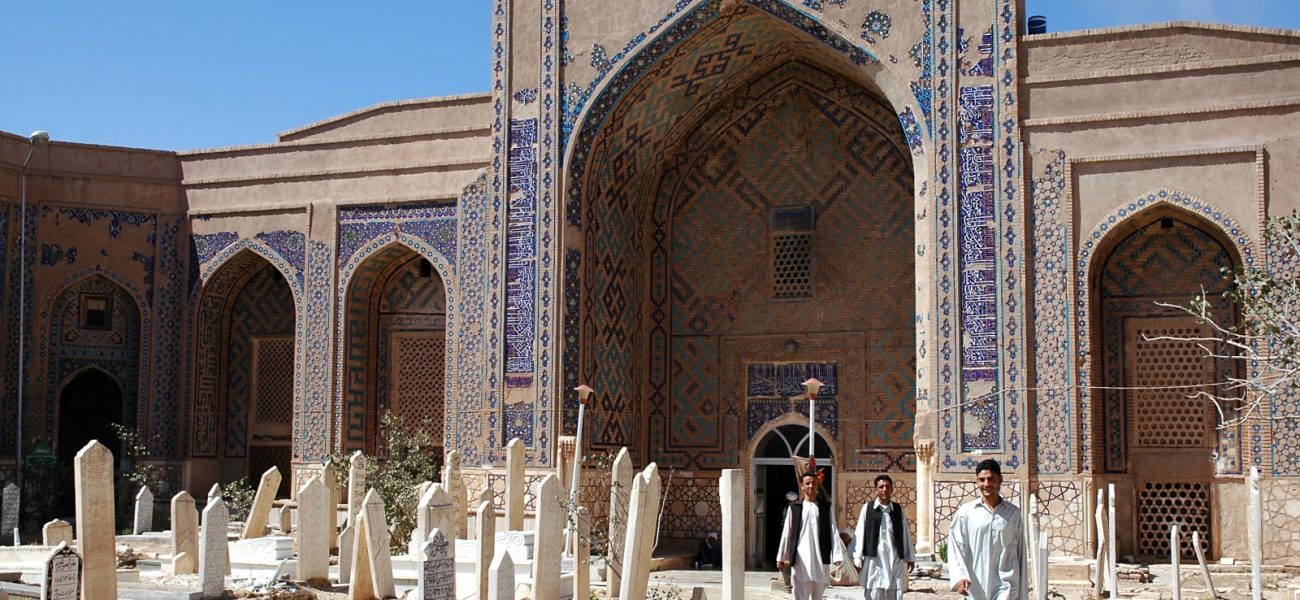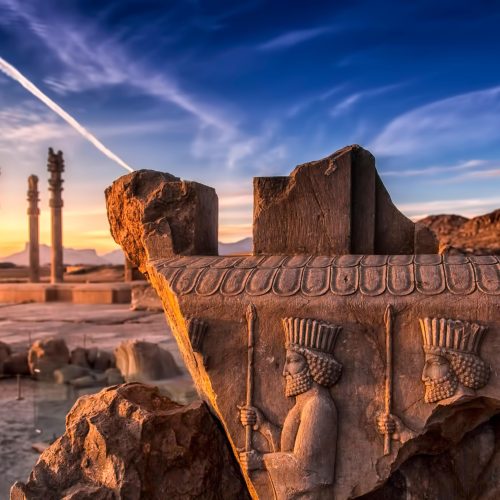In the shimmering heart of the 11th century, amidst the rugged mountains and verdant plains of Khorasan, there arose a spiritual beacon whose radiance still illuminates the paths of seekers today. Abu Ismaïl Abdullah al-Harawi al-Ansari, known lovingly as Abdullah Ansari of Herat, was not just a scholar, a poet, or a mystic—he was a bridge between the worlds, a herald of divine mysteries, and a vessel through which the currents of Sufi thought would flow into the veins of Persian and Arabic spiritual discourse. Born in 1006 CE in the city of Herat, a city that nestled in the cradle of Khorasan’s intellectual renaissance, Ansari’s life was marked by an unwavering devotion to the Sufi path, an unquenchable thirst for knowledge, and an unrelenting love for the Divine.
He was of noble lineage, descending from the illustrious companion of the Prophet Muhammad, Abu Ayyub al-Ansari. Yet it was not nobility of blood that defined Ansari, but rather the nobility of spirit—a spirit that, in every breath, in every word, sought to unveil the shimmering veils of truth that lay hidden in the folds of existence.
This essay, a humble tribute to this towering figure, seeks to weave the threads of Ansari’s life, lineage, spiritual journey, and literary contributions into a tapestry that reveals the depth of his character and the breadth of his impact on the Islamic world, particularly through his contributions to Sufism and Persian literature.
The Life of Abu Ismaïl Abdullah Ansari
In an era where scholars and poets flourished in the shadow of empire, where the ink of knowledge mingled with the blood of conquest, the life of Abdullah Ansari stood as a testament to the pursuit of inner rather than outer dominion. Born in 1006 CE in Herat—at the time a vibrant center of learning—Ansari’s early life was shaped by a fervent quest for knowledge, a yearning that saw him cross the deserts and mountains of Khorasan in search of wisdom.
Herat, positioned strategically on the Silk Road, was a nexus of intellectual and cultural exchange, where Persian, Arabic, and Turkish voices mingled, and where the wisdom of the ancient Zoroastrians mixed with the teachings of Islam. It was within this rich milieu that Ansari was raised, and from an early age, he showed an extraordinary aptitude for religious studies. By the age of ten, he had memorized the Qur’an and immersed himself in the Hadiths and jurisprudence. Yet it was in the mystical realms of Sufism that he would find the true purpose of his life.
Ansari’s Sufi journey was marked by an ardent devotion to the teachings of Hanbali jurisprudence, though he also embraced the mystical insights of earlier Sufi masters such as Abu al-Qasim al-Qushayri and Al-Junayd al-Baghdadi. His path was not one of abstract contemplation but of direct experience—a yearning to encounter God not as a distant force but as a living presence in the heart of the faithful.
Despite his spiritual ascension, Ansari’s life was not free from strife. He faced persecution for his outspoken critiques of certain Islamic scholars and practices, especially his adherence to the Hanbali school of thought, which in Khorasan, dominated by Ash‘ari influences, made him a controversial figure. Ansari’s imprisonment and eventual exile only further tempered his spirit, transforming him into a figure of resilience and grace. It was through the crucible of suffering that his soul was refined, and it is in the heat of this trial that his most profound spiritual insights were forged.
Descendants: The Lineage of a Spiritual Titan
Though the sands of time may have eroded many of the historical details of Ansari’s immediate family, his spiritual descendants are countless. Just as rivers flow from their sources, Ansari’s teachings and influence have continued to nourish generations of seekers who tread the path of mysticism and knowledge.
Abdullah Ansari’s direct descendants, such as his son Abu Mansur Muhammad, played significant roles in preserving and transmitting his legacy, particularly his emphasis on the Hanbali school of thought. However, it is not merely his biological progeny that carries his torch forward, but rather the countless spiritual seekers, mystics, poets, and scholars who have come to drink from the wellsprings of his wisdom.
Herat, the city that bore him, would in centuries to come be renowned for producing Sufi giants such as Khwaja Abdullah Ansari’s great-grandson, Ansar Jami. It was this spiritual lineage that would flower during the Timurid renaissance, a time when the poetic and mystical traditions of Persia reached their zenith. Thus, in a sense, Abdullah Ansari’s descendants are not confined to bloodlines but are scattered across the centuries in the form of mystics, poets, and scholars who have followed in his footsteps, drawn to the deep spiritual reservoir he left behind.
Sufism: The Soul’s Ascent Towards the Divine
At the heart of Abdullah Ansari’s life was his deep immersion in Sufism, a tradition that, for Ansari, was not simply a set of mystical practices but the very marrow of existence. The Sufi path—the path of love, as he would often call it—was for him the journey of the soul back to its divine origin, a journey fraught with trials, tribulations, and, ultimately, transcendence.
Ansari’s Sufism was grounded in the principles of tawakkul (absolute trust in God) and zuhd (asceticism). For him, the spiritual path was not merely an intellectual pursuit, nor was it merely an exercise in piety; it was a radical commitment to stripping away the illusions of the self and embracing the annihilation of the ego—fanaa—so that the seeker could become a vessel for the divine. It was through the effacement of the self that the seeker could encounter the Beloved, the ultimate object of all Sufi longing.
Ansari’s mystical journey was steeped in the teachings of the early ascetics and Sufi saints, yet he was not content to simply replicate their experiences. His contribution to Sufi thought was both practical and deeply personal, a synthesis of profound theological insight and intimate, emotional yearning for God. In this, Ansari anticipated many of the later developments in Sufi metaphysics that would come to characterize the works of mystics such as Ibn Arabi and Rumi.
Ansari’s most famous contribution to Sufi literature is his “Munajat Nama“ (The Book of Intimate Devotions), a collection of prayers and invocations that express the soul’s intimate conversation with the Divine. Written in Persian, the Munajat Nama is a text of unparalleled spiritual beauty, capturing the Sufi’s deepest yearnings for God’s presence, and revealing the subtle interplay between despair and hope, distance and proximity, and separation and union.
The poetic depth of the Munajat Nama mirrors the structure of the soul’s journey toward God, beginning with the cries of the desolate heart, lost in the wilderness of the self, and culminating in the soul’s union with the Beloved. It is this profound emotional range that has made the Munajat Nama a timeless spiritual classic, read by Sufis and lovers of God for centuries.
In addition to his Munajat Nama, Ansari’s contributions to Sufism also include his work “Tabaqat al-Sufiyya” (The Classes of the Sufis), which is one of the earliest attempts to codify the different stages of spiritual realization and categorize the Sufi masters according to their level of spiritual attainment. In this text, Ansari lays out a clear hierarchy of spiritual states, each stage representing a deeper degree of proximity to the divine.
His mysticism, however, was never divorced from orthodoxy. Ansari’s Sufism was always tethered to the practices of the Shariah, the outward law, which he saw as essential for guiding the seeker in the earliest stages of the spiritual path. For Ansari, the Shariah and the Tariqah (the inward path of mysticism) were not separate but intertwined—just as the shell of the nut is necessary to protect the kernel, so too is the law necessary to protect the delicate flower of spiritual experience.
Works: A Literary Legacy in Arabic and Persian
Abdullah Ansari’s literary contributions are a shining beacon in both Arabic and Persian literature, where his works reflect the breadth of his scholarly acumen and the depth of his mystical insight. While his works in Arabic were largely scholarly and expository, his Persian writings, infused with a poetic sensibility, unveiled the profound spiritual depths of his soul.
Works in Arabic: The Language of Scholarship
Abdullah Ansari’s Arabic writings primarily focused on Islamic theology, jurisprudence, and Sufi thought. Though Arabic was the dominant language of Islamic scholarship during his time, Ansari’s Arabic works reveal his deep engagement with Hanbali jurisprudence, particularly in the context of Khorasan, where other schools of Islamic thought, such as the Shafi’i and Ash‘ari schools, held greater sway.
Among his most significant works in Arabic is “Dhikr al-Awliya” (The Remembrance of the Saints), a biographical text that recounts the lives of early Sufi masters, detailing their spiritual states, their miracles, and their teachings. It is through this work that Ansari sought to connect his own mystical practice to the wider tradition of Sufi saints who came before him, showing that his own spiritual insights were part of a longer chain of divine wisdom stretching back to the Prophet Muhammad.
Another important work is his “Kitab al-Risalah” (The Book of the Message), which delves into the theological and spiritual principles that underpin the Sufi path. In this work, Ansari outlines the core tenets of the Sufi journey, emphasizing the importance of taqwa (God-consciousness), ikhlas (sincerity), and muhasabah (self-reckoning) as foundational to the spiritual life. The Risalah serves as both a manual for novices entering the Sufi path and a reminder for advanced seekers of the ultimate goal: union with the Divine.
Works in Persian: The Language of the Heart
Though Arabic was the language of formal Islamic scholarship, it was Persian—the language of poetry and mysticism—that truly captured the ineffable longings of Ansari’s soul. It is through his Persian works that Ansari’s deepest spiritual insights found their most eloquent and heartfelt expression. In the Persian language, he found the vehicle to express the sublime mysteries of the heart, mysteries that transcend rational explanation and enter into the realm of poetic and metaphorical discourse.
The aforementioned “Munajat Nama” stands as his most beloved Persian text. It is a masterpiece of intimate spiritual devotion, wherein Ansari speaks not as a scholar but as a lover. His invocations are filled with deep yearning and passionate cries for the Beloved’s presence. The Munajat Nama is notable not only for its spiritual depth but also for its literary beauty—its rhythmic cadences, its vibrant imagery, and its ability to evoke the deepest emotions in the reader.
Another major work of Ansari in Persian is his “Zad al-Salik” (The Provision of the Wayfarer), a guide for Sufi initiates that outlines the various stations and states of the Sufi path. Written in a simple, direct style, Zad al-Salik is both an instruction manual for the spiritual seeker and a poetic reflection on the beauty of the journey toward God. It is in this text that Ansari emphasizes the importance of patience (sabr), contentment (rida), and love (mahabbah) as the central virtues that sustain the wayfarer on his arduous journey toward the divine presence.
The Timelessness of Abdullah Ansari
The life of Abu Ismaïl Abdullah Ansari of Herat is an enduring monument to the intersection of mysticism, scholarship, and poetic expression. His profound contributions to the worlds of Arabic and Persian literature, his unwavering commitment to the Sufi path, and his deep love for the Divine have left an indelible mark on the spiritual landscape of Islam.
To this day, Ansari’s works continue to inspire scholars, poets, and mystics alike, who see in him not only a teacher and a guide but also a fellow wayfarer on the path toward the infinite Beloved. His writings, infused with poetic beauty and theological depth, remain as vibrant today as they were in the 11th century, offering solace, guidance, and inspiration to all who seek to understand the mysteries of the heart and the divine.
In Ansari’s life and legacy, we find the embodiment of the soul’s longing for God—a longing that transcends time, place, and culture, and speaks to the deepest yearnings of the human spirit.




